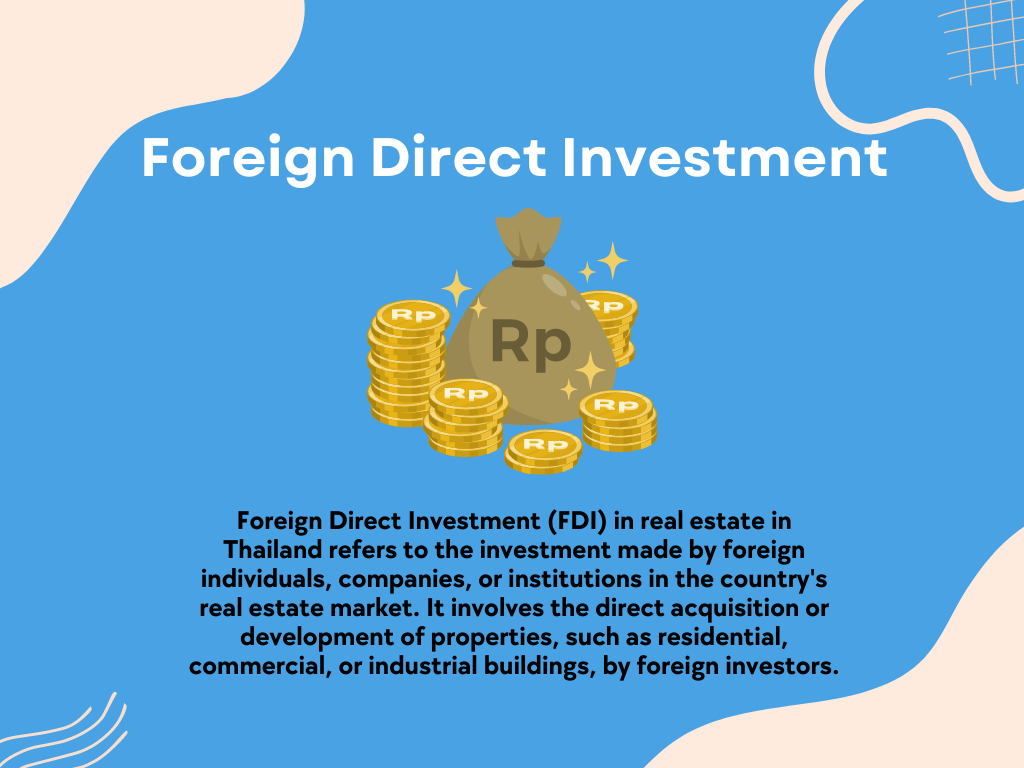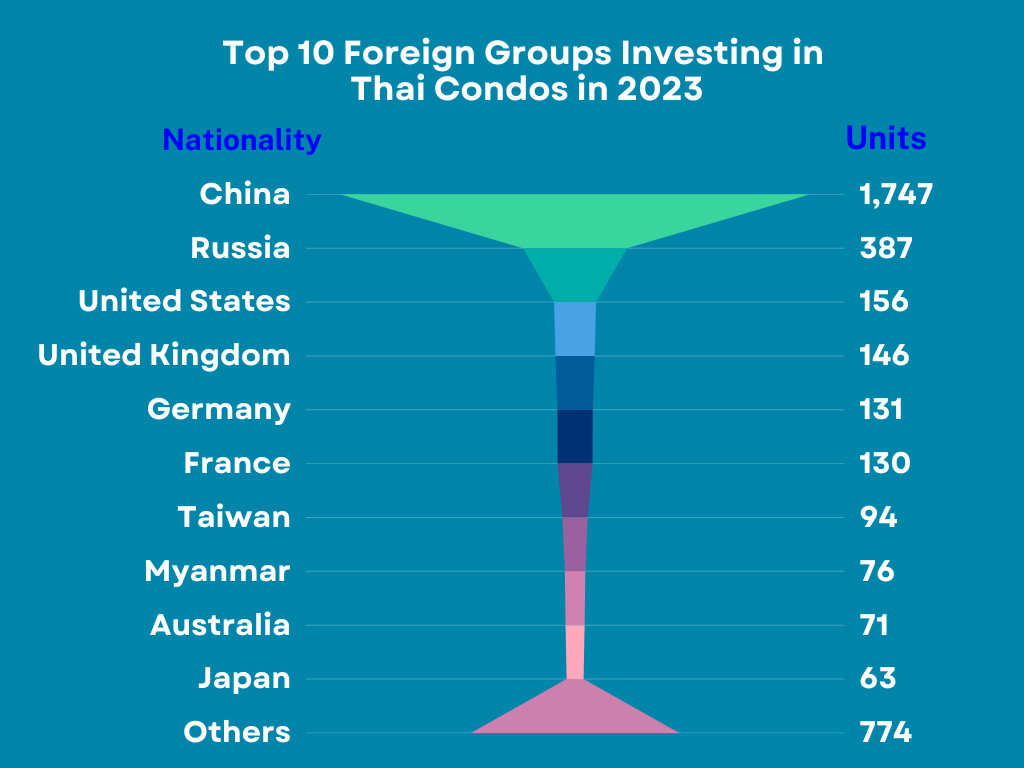- Post your home for sale
- Sign up or Log in
-
English- en
-
THB - ฿
- Buy
- Thailand Property For Sale
- Thailand Real Estate
- See Newest Listings
- Why Buy with KaiBaanThai
- Rent
- Sell
- Projects
- Advice

China and Russia buyers, drawn by the potential returns and lifestyle benefits, are actively investing in Thailand's real estate, contributing significantly to the market's vibrancy. Thailand's real estate market, specifically in Bangkok, Phuket, and Pattaya, saw heightened interest from these foreign investors. Bangkok's condominium market continued its upward trajectory, while Phuket's villa market experienced a sales surge. With a promising recovery forecast for 2022, Thailand's property market, particularly Bangkok condos, Phuket villas, and potentially Pattaya condos, continues to draw in foreign buyers, including those from China and Russia.
Thailand's property market in 2023 is pulsating with dynamic trends. Residential developers focus on launching low-rise projects and clearing inventory, catering to domestic demand. Offices are leaning towards hybrid workspaces, with ESG considerations influencing relocation decisions. Retail landscapes are modernizing and fostering collaborations for mutual benefits. The industrial sector sees an expansion of serviced land plots and increased technology adoption. These trends are shaping Thailand's vibrant property market.
The Thailand property market in 2023 showcases diversity and innovation, with trends such as sustainable and eco-friendly properties, smart homes and digitalization, and the rise of co-living and co-working spaces. Each of these trends is driving significant demand among homebuyers and investors in Thailand, reflecting shifts in consumer preferences and the evolution of lifestyle needs.
Thai developers are actively embracing the global move towards sustainable living, infusing eco-friendly designs into their real estate projects across key areas like Bangkok, Pattaya, and Phuket. Bangkok's skyline now showcases modern skyscrapers with green rooftops, while beachfront villas in Phuket are harnessing renewable energy through solar panels. In Pattaya, residential projects are reducing their environmental footprint through the use of sustainable construction materials and smart home technologies. Government initiatives further fuel this trend, amplifying demand for sustainable properties among local and foreign buyers.
In Thailand, especially in the urban hubs of Bangkok, Pattaya, and Phuket, the real estate market is progressively leaning into the digital age. This shift is evident in the widespread adoption of smart homes - residences equipped with automated systems for enhanced comfort and security, and the digitalization of real estate transactions and operations. Investors and homeowners alike recognize the value of integrating advanced technologies into their properties, increasing convenience and efficiency. This shift towards smart homes is actively transforming the way people live and interact with their homes. Emerging innovations such as AI-powered appliances, home automation systems, and energy-efficient technologies are becoming increasingly commonplace.
Co-living and co-working spaces in Thailand shape the future of the real estate market presenting an innovative approach to living and working environments. These spaces, particularly popular among the younger population, provide a sense of community and shared resources, fostering collaboration and creativity. In 2023, these spaces experienced significant growth, transforming traditional living and working norms. Cities such as Bangkok, Pattaya, and Phuket are witnessing a rise in the number of these spaces, catering to the evolving lifestyle needs of the city's residents.

Foreign Direct Investment (FDI) in real estate refers to the investment made by foreign individuals, companies, or institutions in the country's real estate market. It involves the direct acquisition or development of properties, such as residential, commercial, or industrial buildings, by foreign investors.
FDI plays a significant role in the growth and development of Thailand's real estate sector bringing in external capital, expertise, and technology. These investments contribute to the expansion of the real estate market, the creation of employment opportunities, and the overall economic development of the country.
The Thai government implements policies and regulations to facilitate and encourage foreign investment in the real estate sector, providing incentives and streamlined processes for foreign investors. As a result, Thailand has attracted a considerable amount of FDI in real estate, particularly from countries such as China, Japan, Singapore, and Hong Kong.
This influx of foreign investment has contributed to the development of iconic projects, such as luxury condominiums, hotels, shopping malls, and mixed-use developments, enhancing the urban landscape and driving economic growth in Thailand's real estate sector.
Tourism in Thailand has revived real estate with a significant increase in new business registrations. The Ministry of Commerce reported 2,579 new tourism-related registrations, doubling the previous number, with a 135% increase in registered capital to 6.66 billion baht. Overall, there were 32,223 new registrations across all sectors, a 16.2% increase.
April 2023, 6,041 businesses registered, a 12% year-on-year increase, despite an 88% decrease in registered capital compared to the previous year. The main sectors for new registrations were real estate, general building construction, hotels and restaurants, highlighting the link between tourism and real estate growth.
Most registrations were below 1 million baht, accounting for 65.7% of the total. Registrations between 1 and 5 million baht made up 32.9%, while businesses with over 100 million baht represented only 0.30%.
Despite the positive trend, April saw 936 companies ceasing operations, a 10% increase from the previous year. The sectors most affected were general building construction, real estate, and hotels and restaurants. However, as of April 30, Thailand had 871,041 active companies with a total capital value of 21.2 trillion baht, indicating a strong business landscape supported by the resurgent tourism sector.
The surge of Russian tourists in Phuket can be attributed to several factors. Firstly, relaxed travel restrictions and the reopening of international borders have made it easier for Russians to visit the island. Improved connectivity through direct flights accessibility for Russian travelers.
Additionally, the favorable exchange rate between the Russian ruble and the Thai baht has made Phuket an affordable destination, attracting a larger number of visitors. Phuket's reputation as a safe and desirable destination, with its well-developed tourism infrastructure and diverse attractions, further contributes to its appeal. Businesses in Phuket have adapted to the Russian market by offering tailored services and experiences, such as Russian-speaking staff and specialized excursions.
In the month of April, 63,476 Russian tourists arrived in Phuket, contributing to the bustling tourist landscape of the island. Simultaneously, they are making their presence felt in the property market as well. Last year, Russians emerged as the top buyers of condominiums on the island, accounting for 40% of all condo ownership. During the first quarter of 2022, they purchased 74 units, a significant increase from the 54 units they bought in the entirety of 2021. This surge in Russian property investment seems to be fuelled by a combination of factors, including war-related investor anxiety, and has led to a "super high season" in the property market, according to local sales agents.
Chinese buyers are flocking back to the Chon Buri property market in 2023, following the reopening of China's borders and the revival of tourism in the province. As the leading group among foreign buyers for the fifth consecutive year, Chinese nationals have demonstrated their sustained interest in Thai real estate, contributing to 3,567 condo transfers worth 10.2 billion baht in 2022. With an increasing demand for luxurious three-bedroom pool villas priced over 10 million baht, Chon Buri's property market showcases its potential for high returns on investment, attracting both Chinese and Russian investors alike.
Thailand's property market in 2023 presents exciting opportunities for local and international buyers with a diverse range of investment options. In this dynamic landscape, popular regions like Bangkok, Phuket, and Pattaya stand out, offering a wide array of investment prospects.
“Nattha Kahapana, the managing director of the consulting firm, stated “Chinese and Russian homebuyers are actively fueling the demand in the Phuket real estate market.”
He further added, "Phuket has seen a surge in Russian buyers who are keen to purchase properties for their permanent residence. They have a strong desire to move in without delay." Additionally, he mentioned, "We anticipate an increase in Chinese investors entering the market approximately 7-8 months after the tourist influx."
Additionally, the price index of single-detached houses has seen an increase of 6% year-on-year, and the demand index is up by a significant 58% compared to pre-pandemic times. Bangkok, as a global business hub, is witnessing a surge in demand for rental properties catering to both tourists and long-term residents. Pattaya and Phuket, on the other hand, are sought after for luxury getaways, with villas gaining popularity over condominiums due to the desire for more privacy amid the pandemic.
The government actively pursues initiatives to attract foreign investment in the real estate sector to create a favorable environment for investors and stimulate economic growth. These initiatives streamline regulations and procedures for foreign property ownership, simplifying acquisition.
Additionally, infrastructure development enhances accessibility, particularly through transportation networks, making Thailand appealing to investors. Furthermore, international marketing campaigns promote Thailand's strategic location, competitive property prices, and attractive returns on investment, successfully attracting foreign investment and contributing to overall economic development.
The new property laws in Thailand have been anticipated to create a significant impact on the real estate market. In particular, the Thai government's initiatives and incentives, which include foreign visas and tax advantages on property purchased, are geared towards attracting over a million new foreign investors and professionals within the next five years, injecting an estimated US$30 billion into the economy. These measures were designed in response to a decline in the Thai property market during the pandemic, when foreign purchasing became more difficult due to travel restrictions.
Consequently, this led to potential buyers taking longer in deciding and holding off on Thai property purchases. Now, however, as these conditions become the new normal, new investors are entering the market, bringing with them a renewed demand for properties, particularly for villas as they offer more privacy and less potential for interactions with others, as compared to condominiums. This demand is expected to increase property prices, benefiting sellers who were previously burdened with unsold inventory due to the pandemic. Additionally, locations outside central Bangkok are witnessing a growth in price due to the expansion of business and industrial complexes. Therefore, the new property laws, combined with other economic stimuli, are expected to drive a speedy recovery of the Thai housing market and contribute to overall growth in the Thai economy.
REIC.co.th, a leading authority on Thai real estate, actively delivers up-to-date insights and data on the market. The latest 2022 data reveals China, the United States, France, Russia, and Myanmar as the top foreign buyers of Thai condos, with Chinese nationals making up nearly half of all foreign condo purchases. However, the third quarter of 2022 saw a shift, with the United Kingdom and Germany breaking into the top five condo buying countries.
In 2023, the number of Chinese buyers are increasing for buying condos as China eases its Covid-19 restrictions. The Thai real estate market, especially in key areas like Bangkok, Pattaya, and Phuket, is gearing more towards ready-to-move-in units, a trend that foreign buyers have strongly favored pre-pandemic.
There are about 7,000 new condos launching in downtown Bangkok, over twice the previous year's figure, while midtown and suburban locations will slightly bump up their new condo count to 50,000. Targeting the low- to mid-end market, these areas are where over 95% of Bangkok's new condo supply is found. Also on the rise is the domestic buyers' preference for low-density, adaptable, low-rise houses, prompting developers to ramp up the launch of these low-rise housing projects.
For the resale condo market, buyers show a growing interest in larger, older units that need renovation, as these units offer space seldom found in newer properties.
This wealth of information from REIC.co.th empowers stakeholders in the Thai real estate sector to make informed decisions and strategize effectively.

In the Thai real estate market, several leading developers consistently demonstrate their expertise through remarkable sales and a lasting influence. Pruksa Real Estate, Sansiri, AP (Thailand), Land and Houses (L&H), and LPN Development emerge as industry leaders.
These top Thai real estate developers exemplify excellence, showcasing dedication to meeting market demands and exceeding customer expectations. As they shape the Thai real estate market, their innovative approaches and unwavering commitment to quality inspire the industry's future.

In the dynamic landscape of the Thailand property market in 2023, two formidable forces, China and Russia, emerge as key drivers of growth. With their active involvement and increasing investments, these influential nations are fueling the momentum and shaping the trajectory of the market. Chinese investors, drawn by the allure of Thailand's vibrant real estate sector, contribute to the surge in demand, particularly in popular tourist destinations and major cities. Similarly, Russian buyers, recognizing the appeal of Thailand's lifestyle offerings and investment potential, actively participate in the property market, further propelling its expansion. As China and Russia continue to exert their influence, the Thailand property market stands poised for continued growth, presenting exciting opportunities for developers, investors, and stakeholders alike in the years to come.